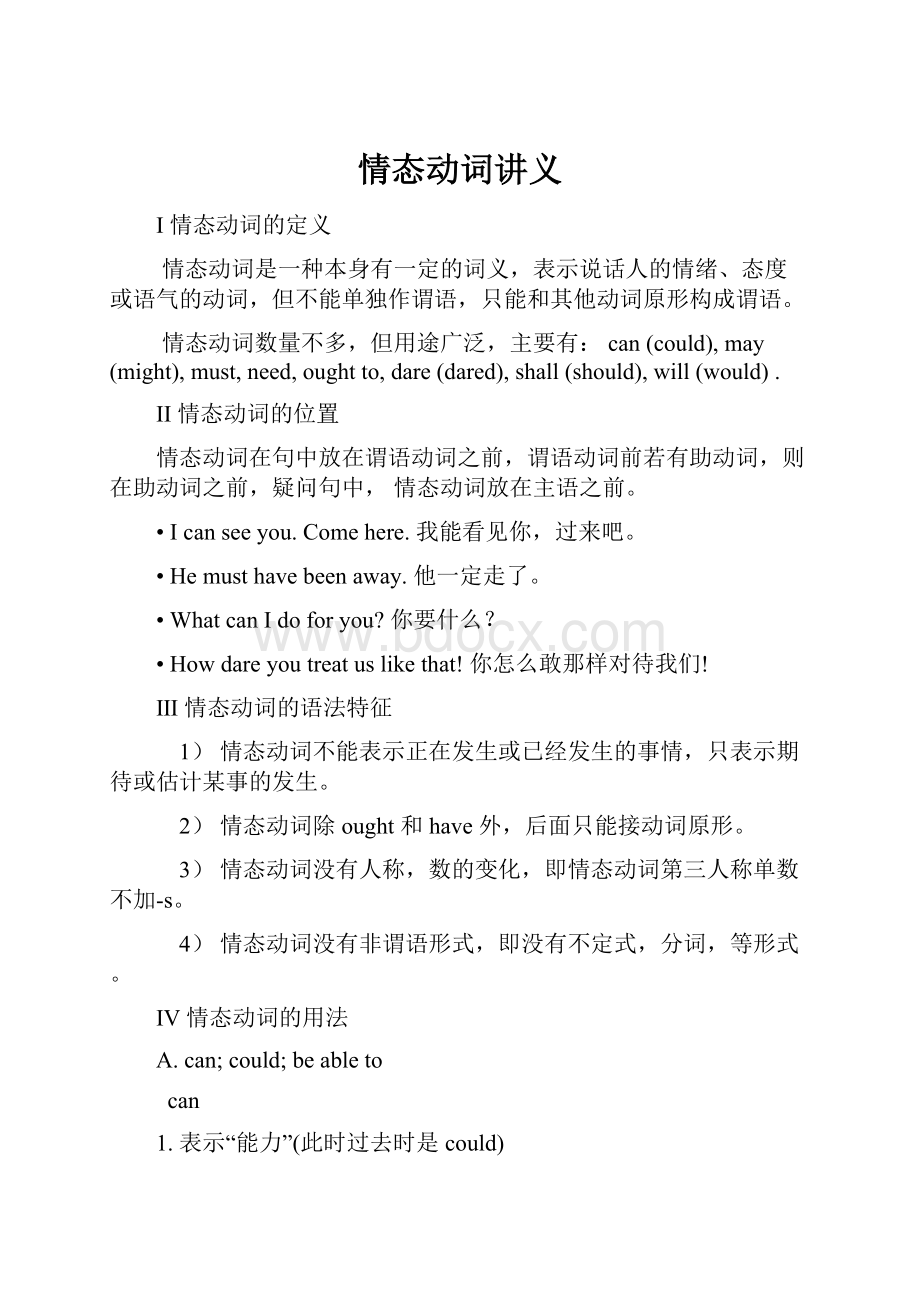情态动词讲义.docx
《情态动词讲义.docx》由会员分享,可在线阅读,更多相关《情态动词讲义.docx(22页珍藏版)》请在冰豆网上搜索。

情态动词讲义
I情态动词的定义
情态动词是一种本身有一定的词义,表示说话人的情绪、态度或语气的动词,但不能单独作谓语,只能和其他动词原形构成谓语。
情态动词数量不多,但用途广泛,主要有:
can(could),may(might),must,need,oughtto,dare(dared),shall(should),will(would).
II情态动词的位置
情态动词在句中放在谓语动词之前,谓语动词前若有助动词,则在助动词之前,疑问句中,情态动词放在主语之前。
•Icanseeyou.Comehere.我能看见你,过来吧。
•Hemusthavebeenaway.他一定走了。
•WhatcanIdoforyou?
你要什么?
•Howdareyoutreatuslikethat!
你怎么敢那样对待我们!
Ⅲ情态动词的语法特征
1)情态动词不能表示正在发生或已经发生的事情,只表示期待或估计某事的发生。
2)情态动词除ought和have外,后面只能接动词原形。
3)情态动词没有人称,数的变化,即情态动词第三人称单数不加-s。
4)情态动词没有非谓语形式,即没有不定式,分词,等形式。
Ⅳ情态动词的用法
A.can;could;beableto
can
1.表示“能力”(此时过去时是could)
Whatcanyoudo?
2.表示许可、请求,“可以”。
在口语中,can可以代替may表示许可,而may比较正式。
(此时用could或might语气更委婉)
--Can/CouldIgonow?
--Yes,youcan.
3表示推测(否,疑),把握很大,could也可表推测(肯,否,疑),把握比can小。
--Look!
Someoneiscoming!
Whocanitbe?
--Itcan’tbehim.HehasgonetoParis.(不可能)
Hecouldbeheresoon.他很快就来。
4表示感情(惊异/不耐烦)“究竟,到底”(主要用于否定句,疑问句和感叹句中。
)
Howcanyoubesofoolish?
Whatcanitpossiblybe?
到底那是怎么一回事?
Theycan’tbeworkingatthistimeofday.
5肯定句中客观存在的可能性。
“有时会,偶尔”
Itcanbequitewindythere,especiallyinspring.
Could
1.表示能力,can的过去式,过去能够
CouldyouspeakEnglishthen?
那时候你会说英语吗?
Lookingdownfromtheplane,wecouldseelightsontherunway.从飞机上向下看,我们可以看见机场跑道上的点点灯火。
2.请求允许(委婉语气)(问句的答语不用could,而用can,)
Could[Can]Iuseyourpen?
”“Yes,ofcourseyoucan.”/No,I’mafraidnot.
3.表示推测可能性(肯,否,疑)
Wecouldgotherethissummer.今年夏天我们可能要去那儿。
(将来可能性)
Youcouldberight,butIdon’tthinkyouare.你可能是对的,但我并不认为你是对的。
(现在可能性)
4.couldhavedone①对过去推测,可能已经。
。
。
②本来能够却没做,差点就
Hecan’t[couldn’t]haveseenherthere.他不可能在那儿见到她。
Hecouldhavegonehome.他可能已回家了
Hecouldhavetoldher,buthedidn’tchooseto.他本来可以告诉她的,但他却没有。
Youcouldaskmebeforeyouusemyphone.你打电话之前本来可以问我一声。
IwassoangryIcouldhavekilledhim.我是那样生气,差点把他杀了。
☆can和beableto都可以表示能力,意思上没有区别,但can只有现在式和过去式(could),而beableto则有更多的形式。
过去时:
were/wasableto
将来时:
will/shallbeableto
完成时:
have/hasbeenableto
★如果要表达将来的能力时,一般要用will/shallbeableto.
•Nooneisabletodoit.
•Weshallbeabletofinishtheworknextweek.
•Ihaven’tbeenabletofinishthebook
☆Could与was/wereableto的区别:
could只表有能力,was/wereableto意含”过去某时经过努力设法做成了某事”,还可以表示结果
Theyworkedhard,sotheywereabletodomoreforthecompany.
Hecouldcuretheoldman’sillness.(能治好)
Hewasabletocuretheoldman’sillness.(治好了)
B.may和might
may(过去式might)
1.表示允许﹑许可,might提问更委婉。
口语中可用can/could.
•---May/MightIwatchTVaftersupper?
---Yes,youmay./Yes,please./Certainly.
---No,youmustn't./No,youmaynot./No,youcan’t.
---No,you’dbetternot.
2.表示推测(肯,否),有“或许”、“可能”的意思。
might把握更小。
疑问句用can/could
•Hemayberight.
•Iheartheremaybeafewcopiesleft.
•Hemaycometoday(tomorrow).
•Hemightcometoday(tomorrow).
3.表示祝愿,倒装。
Mayyousucceed!
Mayyouhavemanymoredaysashappyasthisone.
might
1.may的过去式
HesaidthatImightborrowthisbook.
2.许可(委婉语气)MightI...
3.表示推测(肯,否)“或许”“可能”把握比may小。
疑问句用can/could
Hemightgetthereintime,butI’mnotsure.
☆may[might](just)aswell…
意为“不妨”、“还是…为好”等,用might比用may语气更委婉。
如:
I’mready,soImightaswellgonow.我已准备好,因此不妨现在就走。
There’snothingtodo,soImay[might]aswellgotobed.
☆maywell...完全可能
C.must,haveto
must
1.must表示“必须”。
否定式mustnot(mustn’t)表示“不应该”、“不许可”、“不准”、“禁止”等。
•Everybodymustobeytherules.
•Theworkmustbefinishedassoonaspossible.
•Youmustn’tlendittoothers.
•Youmustn’tspeaklikethattoyourmother.
☆在回答有“must”的询问时,否定式常用neednot(needn’t)/don’thaveto表示“不必”,而不用mustnot,因为mustnot表示“禁止”“不可以”
---MustIgonow?
---Yes,youmust.
---No,youneedn’t./No,youdon’thaveto.
2.must表示推测(“一定”、“必定”),只用在肯定句中,其否定形式为can’t,表示“不可能”
•Youmustbehungryafterthelongwalk.
•TheChineselanguagemusthavethelargenumberofspeakers.
3.must表示说话人不耐烦的态度,“干嘛偏要”
☆must+have+done,表示对过去事物的肯定推测。
“一定做过...”
Hemusthavetoldmyparentsaboutit.他一定把这件事情告诉我父母亲了。
☆must表示推测时,其反意疑问句应根据动词的实际时态而变化。
如:
▪Itmustbenicetotakeawalkhere,isn’tit?
▪Tombuysalotofapples,hemustlikeeatingthem,doesn'the?
Musthavedone的反意疑问句有三种情况:
①从句中含有过去的时间状语,反意疑问句用过去时.
▪Thegroundiswet,itmusthaverainedlastnight,didn’tit?
②从句中含有过去完成时的时间状语,反意疑问句用过去完成时.
▪Bytheendoflastterm,wemusthavelearnt2000words,hadn’twe?
③若从句中不含任何时间状语,反意疑问句用现在完成时
▪Wemusthavebeenmetsomewhere(before),haven’twe?
☆must表示“必须” “有必要”时,反义疑问句部分用mustn’t...?
或needn’t...?
Youmustgohomerightnow,needn’tyou?
☆must用否定形式mustn’t时,附加疑问句部分用may或must…?
Youmustn’tcheatintheexamination,mustyou?
3.表示与说话人愿望相反及不耐烦.意为“偏要”.
-____youmakesomuchnoise?
(A)
-Sorry,Iwilltakecarenotto.
AMustBCanCMayDWould
4.must和haveto的区别:
must表示说话人的主观看法,haveto“不得不,必须”,表示客观需要、客观条件只能如此。
haveto比must有更多形式。
mustn’t表示“决不能,禁止,一定不要”,而don’thaveto表示“不必要”.(英国英语常用needn’t).
•Idon’tliketheTVset.Imustbuyanewone.(主观看法)
•TheTVsetisbroken.Ihavetobuyanewone.(客观需要)
•Hehadtospendhischildhoodinhardwork,helpinghisfatherontheirsmallfarm.
•Youwillhavetodoitagain。
(将来)
D.oughtto/should/shall
oughtto
oughtto用于反映客观情况或涉及义务和规定时,常译作“应该”、“应当”(和should差不多,只是语气较强),有时表示非常可能的事情。
•Thereoughtnottobemuchnoiseinahospital.
•---Oughthetogo?
---Yes,heoughtto.
•Ifsheiscompletelywell,sheoughttobebackatschooltoday.
oughttohavedone指过去动作,表示一件事情该做而未做。
oughtnottohavedone表示一件不该做的事情却做了。
should
1.用于表示劝告和建议,“应该”.表示自己的主观看法,语气比oughtto弱。
Youshouldkeepyourpromise.
☆should+havedone指过去动作,表示一件事情该做而未做。
shouldnot+havedone表示一件不该做的事情却做了。
---Whodiditsoundlike?
Anybodyyouknow?
---Well,perhapsJeff.Ishouldhaveaskedwhowascallingbeforehehungitup.
2.表推测,“按道理,按常理应该”
Theyshouldhavearrivedbytwoo’clock.
3.表示惊讶,赞叹,不满,责备“竟然”
Iamsorrythatyoushoulddosuchathing.
4.用于if引导的虚拟条件句中,表示一件事听起来可能性小,但也不是完全不可能。
有“万一”的意思
ShouldIbefreetomorrow,I’llcome
AskTomtoringmeupifyoushouldseehim.
shall
1.shall作为情态动词,用于第二、第三人称,陈述句,表示说话人的意愿,有“命令”、“警告”、“威胁”、“强制”、“允诺”等意思。
“必须,应,可以”.
•YoushalldoasIsay.(命令)
•Tellhimthatheshallhavethebooktomorrow.(允诺)
•Youshallbepunishedifyoubreakthelaw.(表警告)
2.用于第一、第三人称,在疑问句中,shall用来征询对方意见。
“……好吗?
”“要不要……?
”
•WhereshallIwaitforyou?
•Shallhecomeatonce?
•Shallwestartthemeetingnow?
3.在条约﹑规定﹑法令等文件中表示义务或规定,用于第三人称
ThenewregulationshalltakeeffectonJune1st
E.will和would
will
(1)will表示“意志”、”决心”、“意愿”,可用于多种人称。
will指现在,would指过去。
•Iwilltellyouallaboutit.
•Hewon’tgo.
(2)will在疑问句中用语第二人称时,表示询问对方的意愿或向对方提出请求.委婉语气would
•I’mgoingtogoshoppingafterschool.Willyougowithme?
•Willyoupleasegivehimamessagewhenyouseehim?
(3)表示习惯动作,有“总是”、“惯于”的意思。
过去式would
He’lltalkforhoursifyougivehimthechance.
(4)表示功能,“能”
Thedoorwon’topen./Thecarwon’tstart.
(5)用于叙述真理,客观规律时“会”
Oilwillfloatonwater./Fishwilldiewithoutwater.
would
(1)Would是will的过去式,表示过去时间的“意愿”、“愿望”,用于多种人称。
•Theysaidthattheywouldhelpus.
•IpromisedthatIwoulddomybest.
(2)表示说话人的意愿或向对方提出请求,语气比will委婉。
指的是现在时间。
•Wouldyoulikesomebananas?
•I’dliketoseeyournewbicycle.
•---Wouldyouliketoseeafilm?
---Yes,I’dliketo.
•---Thanks.I’mafraidnot./I’mafraidIwon’tbeableto.
(3)表示过去的习惯动作。
•Shewouldsitlikethatforhours.
•Everydayshewouldgetupatsixo’clockandlightthefire.
☆would和usedto区别:
Would“过去常常”可用来表示过去反复出现的动作,但不能表示过去存在的状态,所以,不能说:
Shewouldbeaquietgirl.Usedto则着眼于过去和现在的对比,隐含“现在已不复如此”之意,动作或状态都可表示.Sheusedtobeagirl.
Whenyoung,hewouldgooutforatriponSundays.(Nowmaybestilldoes)
•Whenyoung,heusedtogooutforatrip.(Butnowhedoesn’t)
Nearthevillage,there_____beastream.(B)
A.wouldB.usedto
F.need和dare
1.need表示“需要”、“必须”。
通常用在否定句或疑问句中。
•Heneedn’tpayforit.
•---Needyougonow?
---Yes,Imust.---No,Ineedn’t.
2.dare表示“敢”。
通常用于否定句、疑问句、条件从句和if/whether引出的宾语从句中。
•HowdareyousayI’munfair?
•Shedarenotdoso.
•HeaskedmeifIdaredspeakEnglishinpublic.
☆need和dare也可用作行为动词,变化与一般动词相同
•Shedidn’tneedtogo.
•---Whodarestogo?
---Idon’tdare(to)go.
☆Idaresay…作插入语,我想,大概,可能,或许
☆“needn‘t+havedone”表示过去做了没必要做的事情。
Youneedn'thavetakenitseriously.
这件事情你不必太认真。
G.hadbetter/hadbest“最好”,如:
—Wehadbettergonow.
—Yes,wehad(we'dbetter/wehadbetter).
Hadn'twebetterstopnow?
(Hadwebetternotstopnow?
)
IthinkI'dbetterbegoing.(用于进行时态,表“最好立即”)
Youhadbetterhavedonethat.(用于完成时态,表未完成动作)
注:
①hadbest与hadbetter同意,但较少用。
②Youhadbetter…用于同辈或小辈,对长辈不可用
Ⅵ情态动词+havedone
musthavedone,“一定做过/一定已经...”,表示对过去情况极大把握地推测,仅用于肯定句
may/mighthavedone也许做过某事may/mightnothavedone也许没做过某事(之用肯、否)
mighthavedone本来可以做某事却没做
can与havedone连用时,为否定句或疑问句,对过去的推测“不可能,一定没做过某事”
couldhavedone本来可以做某事却没做
needn’thavedone表示”本来不必做(却做了)”而needn’tdo则表示”不必做(也没做)”
oughtto/shouldhavedone表示”本来应当做的却没做”
oughtn’t/shouldn’thavedone本来不应该做某事却做了
would/could/might/should+havedone用来表示与过去事实相反的虚拟语气
wouldratherhavedone表示”当时宁愿做了某事”,否定形式:
wouldrathernothavedone
e.g.IfIhadbeenfreethatday,Iwouldhavegonewithyou.
wouldlike/lovetohavedone表示”本想做某事”而实际上未做。
情态动词+bedoing表示根据推测,现在正在进行或可能正在进行的动作。
Eg.Hismothermustbewaitingattheschoolgate.
情态动词+bedone表示现在或将要发生的被动的动作。
Menmustnotbejudgedbytheirlooks.
情态动词+havebeendone表示对过去已经发生的被动动作的猜测,有时含有指责,抱怨等不满的情绪。
Ican’tfindmyrecorder.itmayhavebeentakenawaybysomeone.
情态动词+havebeendoing表示根据猜测,从过去到现在一直在进行的动作,具有“应该一直在……”或“想必一直在……”等意思。
Theymayhavebeendiscussingtheproblemthismorning.
一、单项填空:
本大题共41小题,共计41分。
1、【1分】Theteacher_________